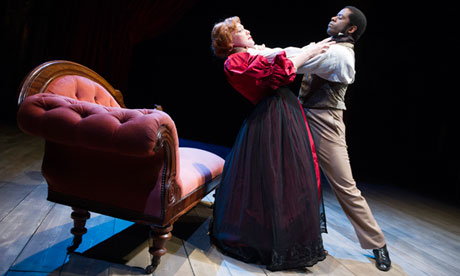Lolita Chakrabarti
Directed by Indhu Rubasingham
★★★★
Pros: Lolita Chakrabarti’s script allows audiences to see a flawed yet brilliant man let down by London.
Cons: It’s a shame about the last thirty seconds before the lights go dark at the end. The last scene is the only really weakness in the entire show.
Our Verdict: A very important man has been left out of the history books because he was black. A brilliant, succinct show with neat yet complex characters that mirror reality. We’re prophesising a clever season ahead for this theatre.
 |
| Courtesy of Tristram Kenton for The Guardian |
Have you heard of Ira Aldridge? If you have, you are more in the loop than I was walking into the Tricycle Theatre for Indhu Rubasingham’s debut as both director of this show and Artistic Director of the theatre. For those of you who haven’t don’t worry, he has been quietly excluded from our history books. Here’s a brief outline which might go some way towards explaining why he’s unknown: Ira Aldridge was a black American stage actor in the 1800’s whose debut at the Theatre Royal, Covent Garden in 1833 saw him replace white actor Edmund Kean in the title role of Shakespeare’s Othello. Of course, prejudices still existed in England, and Othello closed after only a handful of performances. Aldridge was exiled to Eastern Europe, where he was greatly rewarded for his acting, but he was never to return to London.
Lolita Chakrabarti’s play opens with a young, gutsy reporter attempting to interview a cantankerous old Aldridge (Adrian Lester) in his dressing room in Poland about his experience of treading the boards of a London stage. We follow Aldridge’s mind as it wanders back 34 years until we begin to understand the hardships he had to face as (perhaps) the first black actor taking centre stage. Lester is a familiar actor to most of Britain and takes on this role with real determination and gusto. The character is complicated, but Lester lets the actual story do much of the talking while simultaneously not letting it distract from his performance, a fine balance which many couldn’t achieve. The ensemble were equally strong, I particularly enjoyed Natasha Gordon as Connie, the black servant whose practical take on Othello’s character I suspect our less pretentious selves all agree with, and Eugene O’Hare as Pierre Laporte, the manager of Theatre Royal who took a gamble on his friend Ira Aldridge which he then lost.
Chakrabarti’s script was, on the whole, very engaging. There were a few moments when it seemed to lack the correct phrasing of the 19th century, but all in all her use of the characters intelligently allowed the audience to experience the various and mixed emotions of London’s response to a black actor on stage without being overawed by the complex opinions. Her verbatim use of the reviews from the time caused a necessary gasp from the audience, and by quoting Shakespeare she allowed us a teasing glimpse into Lester’s ability to perform the Bard’s work. I now look forward with great anticipation to Lester’s Othello due next year.
A very important man for diverse theatre has been left out the history books because he was black. Looking back now we see someone who wouldn’t be out of place on stage in 2012, a figure whose very being forced progression and in some small way is to thank for the development of theatre into what it is today. Not because he was some great revolutionary – as far as the play told his story Aldridge wasn’t a Martin Luther King, he wasn’t even an active rights campaigner – but because he was proud of his heritage and proud of his race. Most of all however, he knew he could act and he knew he could act better than many of the white men on stage at the time. This is where his strength came from, and this is what modern audiences should take away from this show.
I sat throughout the entire play, enthralled by the performances, by the cruelty or the apathy that flowed through the theatre ensemble and Aldridge’s staunch belief in his art form. I thought it was a five star performance until the very last scene where, unfortunately, it was a little let down by the petering out of the play and the obvious use of the other actors to represent “ghosts of his past” as the aging, dying Aldridge whites-up to perform King Lear. This is a strong play however and perfectly represents what Indhu Rubasingham has in store. Not only should you see this show but we should all expect to see a number of high quality and intensely interesting pieces about people, places and events we have never thought about before coming out of this revitalised theatre. I don’t know about you but I’m quite excited for the Tricycle’s future.
Please feel free to leave your thoughts and opinions in the comments section below!
Red Velvet runs at the Tricycle Theatre until 24th November 2012.
Box Office: 020 7328 1000 or book online at http://www.tricycle.co.uk/current-programme-pages/theatre/theatre-programme-main/red-velvet/
 Everything Theatre Reviews, interviews and news for theatre lovers, London and beyond
Everything Theatre Reviews, interviews and news for theatre lovers, London and beyond


